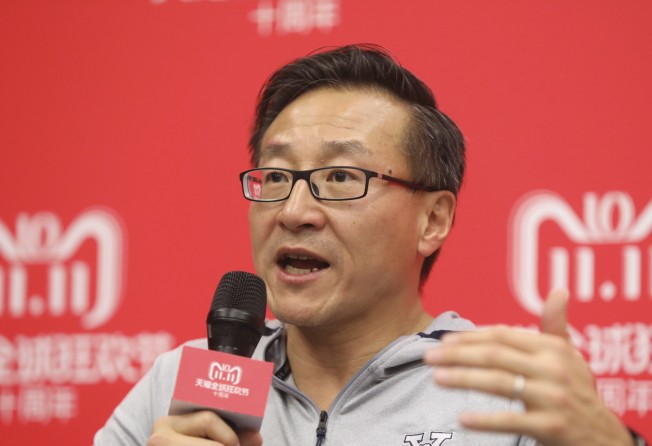Trade war won’t derail rise of China’s middle-class consumers, Alibaba’s Tsai says
- US-China trade war accelerating shift to consumption-driven economy, Alibaba executive vice-chairman Joe Tsai says

The US-China trade war will not derail the rise of China’s middle-class consumers, who are estimated to double in number to 600 million in the next 10 to 15 years and will power a long-term upgrading of consumption spending in the world’s second-biggest economy, said Alibaba Group Holding executive vice-chairman Joe Tsai.
“China’s GDP per capita was about US$800 per person back in 1999 when I joined the company, and has risen to about US$9,000 per person today, an average across 1.3 billion people,” Tsai told reporters at a briefing in Shanghai on Sunday for Alibaba’s Singles’ Day shopping festival. “Is it going to US$20,000, US$30,000 in the future? Absolutely, it’s happening.”
Alibaba’s 24-hour shopping frenzy beats 2017’s US$24 billion record
Tsai made the comments a few hours before Alibaba set a record 213.5 billion yuan (US$30.8 billion) in gross merchandise value for its flagship 24-hour retail event, a 27 per cent increase over last year. Singles’ Day got its name from its date, November 11. Written numerically as 11/11, the date looks like “bare branches”, a Chinese expression for the single and unattached.
Today, Singles’ Day has expanded to become a shopping festival for everyone, and Alibaba holds an annual Double 11 star-studded gala packed with celebrities and performances to entertain its millions of users as they shop.
The strong showing for Singles’ Day may help assuage concerns that the trade war with the US has dented consumer confidence in China. Analysts expect the trade stand-off with the US to hit manufacturing numbers at the start of next year.
Consumer spending in China is built on “double digit” wage growth in the past 10 years and a high savings rate, with the urban Chinese consumer “very curious” about trying new products and interested in imported products, Tsai said. All of this will drive the long-term trend of an upgrading in consumption by the Chinese consumer, he said.
The trade war is accelerating the shift of the Chinese economy from an export-led economy to one that is driven by consumption, which will increase as a percentage of GDP, he said. Alibaba remains “very bullish” on long-term prospects of Chinese consumption, he said.
Tsai also said that many investors see Alibaba's stock as a proxy for China, with the company's stock price reflecting investors' sentiment on China.
“But a lot of the investors get it wrong. China is not as bad as people think,” Tsai said. “Alibaba has some unique aspects, we're really riding the secular trend [of the rising middle-class in China].”
He added that Alibaba is uniquely positioned in tech and has the know-how to help digitise the economy, by helping enterprises digitise their operations so they can serve consumers better.
“These are some aspects of our business that people should understand better,” he said.
Asked about his role in Alibaba in the future, Tsai said that he and Jack Ma, who will step down as executive chairman next year, will continue to focus on developing the next generation of leaders at the New York-listed company.
“My most important role is to develop talent because Alibaba emphasises how to help the next generation of young people take over,” he said. “If I can see younger people do better than me, it is the happiest thing for me.”
Alibaba is the owner of the South China Morning Post.